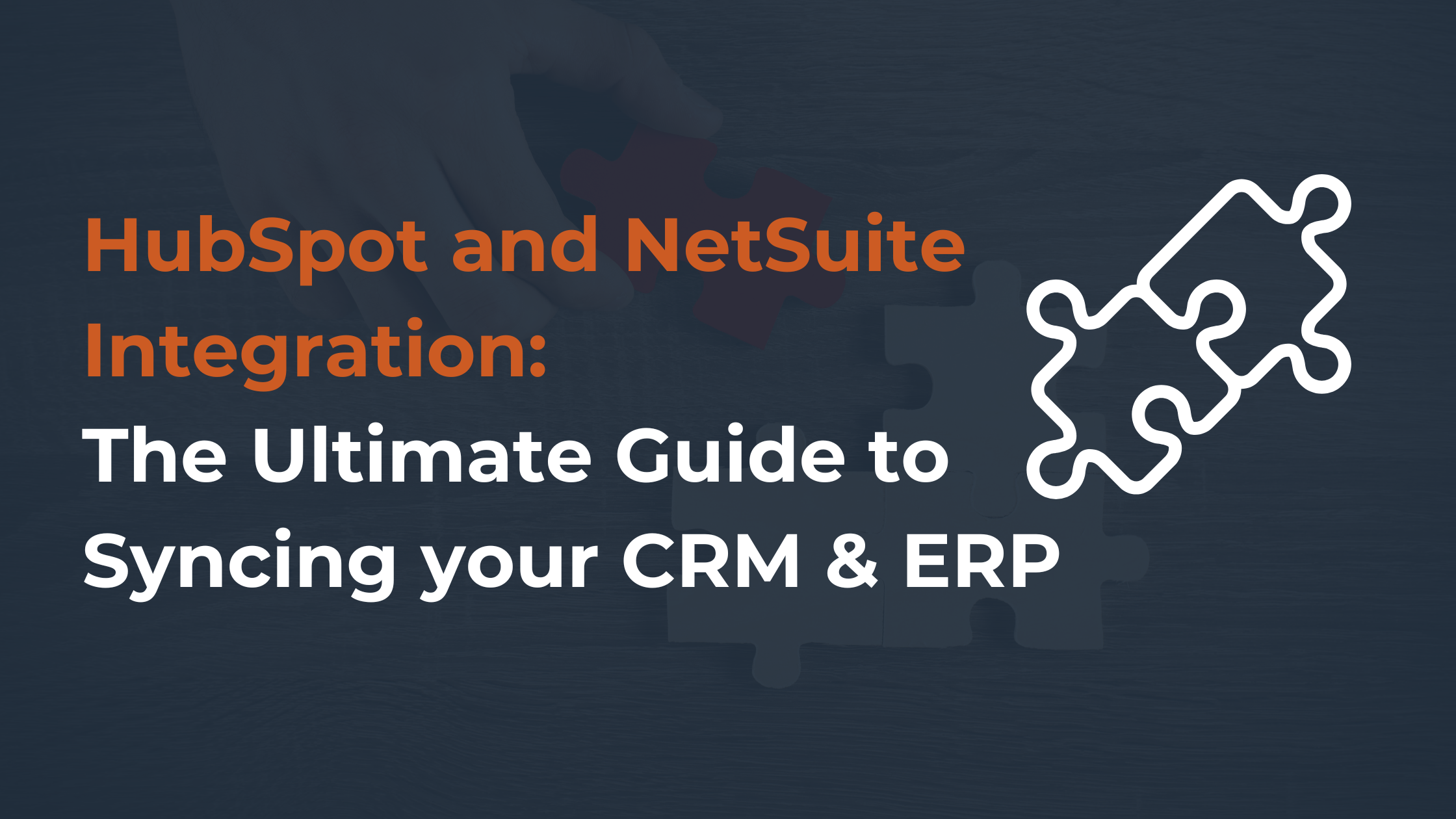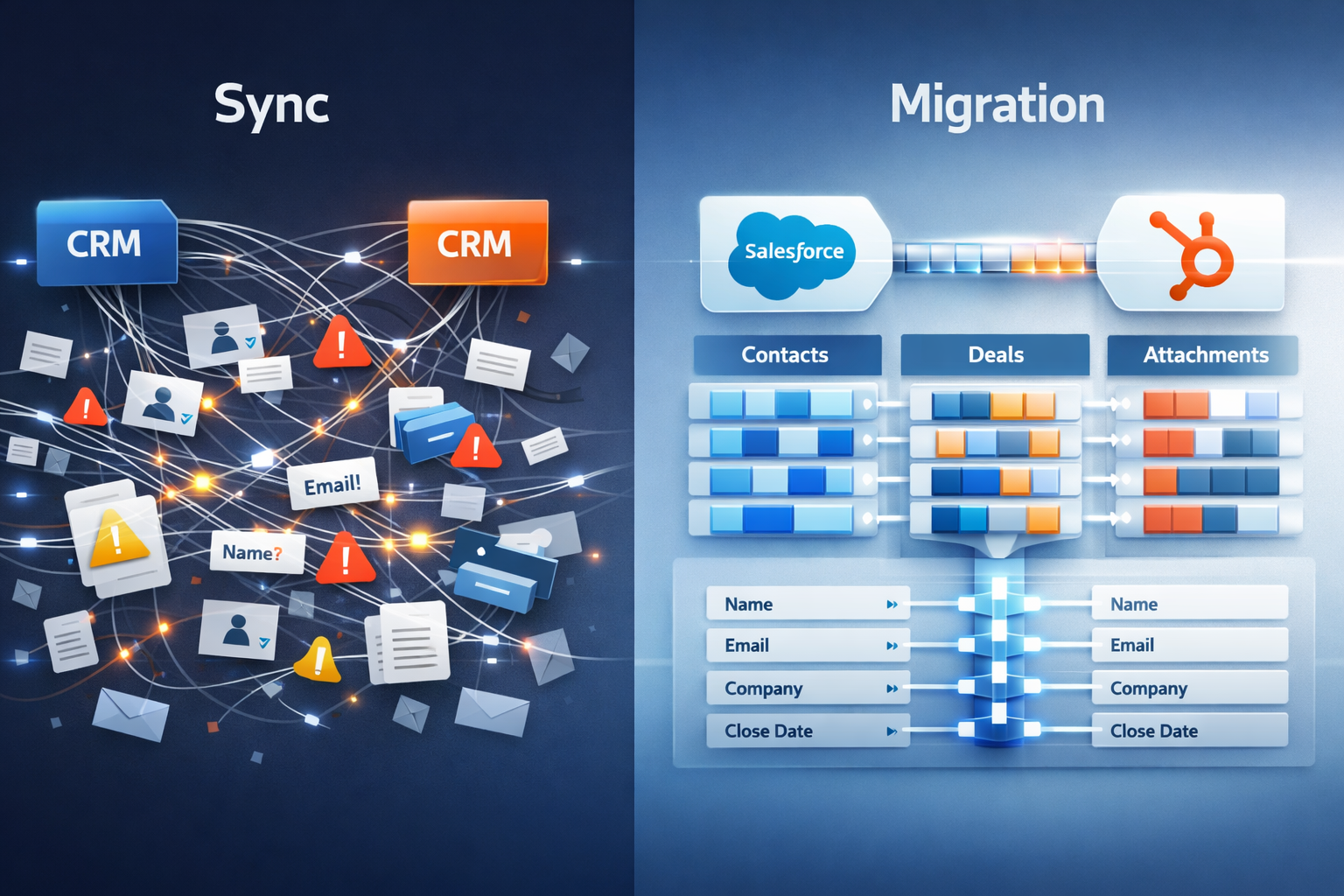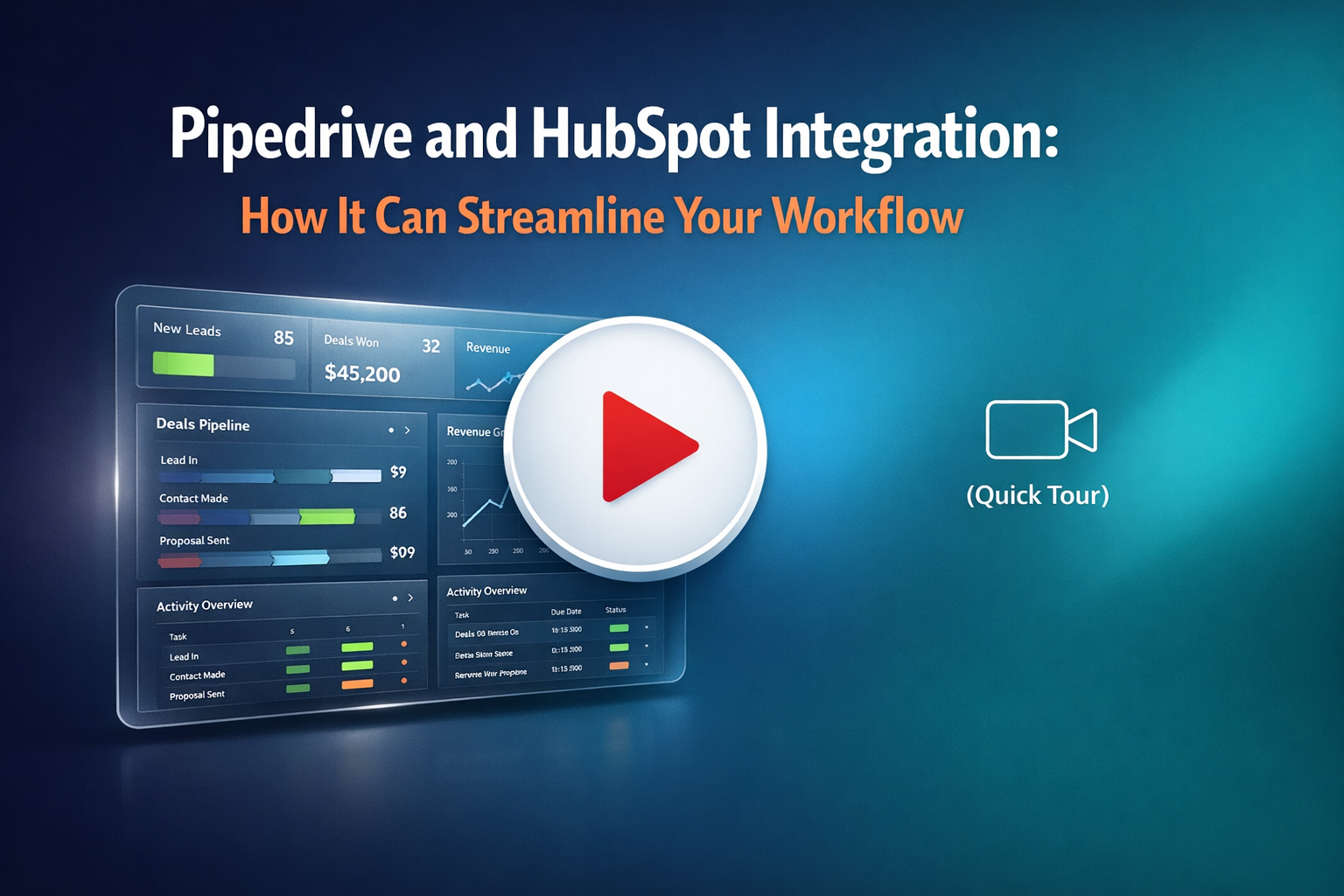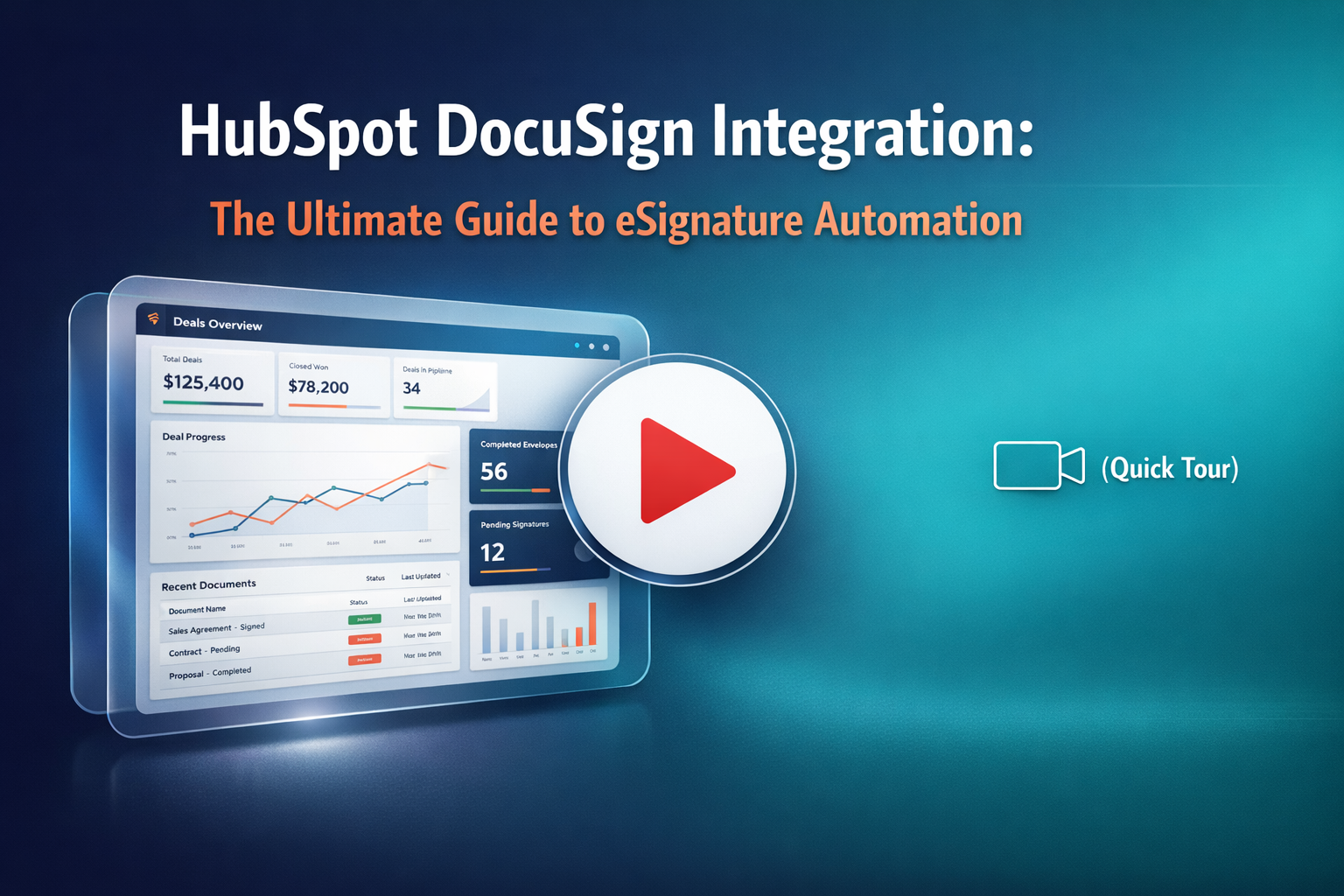Table of Content
-
How HubSpot and NetSuite work together to improve business results
-
Best ways to connect HubSpot & NetSuite (API, iPaaS, custom development)
-
Comparison of different HubSpot & NetSuite integration solutions
-
Ensuring data security when integrating HubSpot and NetSuite
-
How customer support helps maximize the ROI of your integration
- FAQs
Who needs HubSpot & NetSuite integration?

Integrating HubSpot and NetSuite is essential for businesses that want seamless data flow between their marketing, sales, and finance teams. Here are the key types of organizations that benefit from this integration:
- Growing B2B companies: Companies scaling their operations often struggle with siloed data. Integrating HubSpot and NetSuite ensures accurate customer records, automated lead-to-cash processes, and real-time sales insights.
- E-commerce and retail businesses: Businesses selling products online need a tight connection between customer interactions, orders, and financial data. This integration keeps opportunities, sales orders, invoices, and customer communications in sync.
- SaaS and subscription-based companies: SaaS companies using HubSpot for lead generation and marketing and NetSuite for billing and revenue recognition can automate subscription lifecycles, renewals, and customer updates.
- Manufacturing and wholesale distributors: Companies managing complex supply chains require order tracking and financial reporting between HubSpot (customer-facing) and NetSuite (back-office ERP).
- Professional services firms: Consulting, legal, and financial service firms need HubSpot to manage client relationships and marketing while using NetSuite for project accounting and billing.
How HubSpot and NetSuite work together to improve business results
Integrating HubSpot and NetSuite creates a seamless connection between sales, marketing, finance, and operations. With real-time data synchronization, businesses can streamline processes like lead management, order fulfillment, and revenue tracking. Sales teams gain access to up-to-date customer information, while marketing can leverage accurate data for personalized campaigns. Meanwhile, finance teams benefit from automated invoicing and payment tracking, ensuring a smooth lead-to-cash process. This integration not only reduces manual work and errors but also accelerates sales cycles and improves cash flow.
Beyond efficiency, the integration enhances the customer experience by providing a 360-degree view of customer interactions across departments. With access to real-time order history and customer preferences, businesses can offer more personalized engagement, improve customer support, and ensure consistent communication across all touchpoints. Automation further boosts productivity by eliminating repetitive tasks, allowing companies to scale.
Key benefits of integrating HubSpot with NetSuite
Here are some HubSpot Netsuite integration benefits:
✅ Clean and accurate data management
Integrating HubSpot and NetSuite ensures data accuracy by automatically validating and updating records before syncing them across platforms. With accurate and up-to-date data, businesses can avoid inefficiencies caused by inconsistent records.
📈 Optimized revenue strategies
With seamless integration, businesses gain deep insights into marketing performance, sales effectiveness, and cross-selling opportunities. Predictive analytics enable companies to forecast trends, refine revenue strategies, and make decisions that drive profitability and long-term growth.
🎯 Personalized customer experiences
Aligning marketing, sales, and customer success teams ensures a more personalized and consistent customer experience. Real-time, accurate data allows businesses to deliver highly targeted marketing campaigns, enhance engagement, and build stronger relationships with their customers.
🚀 Comprehensive lead data for sales teams
Sales teams benefit from complete and reliable lead data, allowing them to prioritize prospects. Custom data transfer rules ensure smooth synchronization between HubSpot and NetSuite, reducing manual data entry. Automated KPI tracking and AI-powered insights improve team collaboration and provide a deeper understanding of customer needs, leading to higher conversion rates and increased revenue.
📊 Enhanced visibility and reporting
Syncing data between HubSpot and NetSuite provides a 360-degree view of customers. Real-time insights lead to more accurate financial reporting, better campaign attribution, and improved performance analysis, enabling companies to refine their strategies for maximum impact.
🔄 Increased efficiency through automation
Automating workflows reduces manual effort, minimizes errors, and accelerates critical business processes. By eliminating repetitive tasks, companies can focus on closing deals faster, improving customer interactions, and boosting overall productivity.
Best ways to connect HubSpot & NetSuite (API, iPaaS, custom development)
Choosing the right integration method depends on business needs, budget, and technical capabilities. Here are the best ways to integrate HubSpot and NetSuite:
API-based integration
HubSpot and NetSuite both offer robust APIs, allowing businesses to create direct connections between the two platforms. Here is how HubSpot Netsuite API integration works.
How it works:
- Developers use HubSpot APIs and NetSuite’s SuiteTalk API to build a direct integration.
- Data is mapped and transferred between systems based on business rules.
- Custom logic ensures real-time or scheduled synchronization of leads, deals, contacts, orders, and financial data.
Pros:✔️ Flexibility ✔️ Real-time synchronization ✔️ Multi-system connectivity |
Cons:❌ Requires technical expertise and coding skills. ❌ Ongoing maintenance ❌ Potential for errors ❌ Security risks |
Best for: Companies with in-house developers or tech teams.
iPaaS (Integration Platform as a Service)
An iPaaS solution like SyncMatters provides pre-built and scalable HubSpot and Netsuite integration services. Here, you can read how to integrate HubSpot with Netsuite using the iPaaS solution.
How it works:
- iPaaS tools connect HubSpot and NetSuite via pre-configured HubSpot Netsuite connectors.
- Users can map fields, automate workflows, and set triggers without coding.
- The platform monitors and maintains the connection, reducing manual effort.
Pros:✔️ Fast deployment ✔️ Low-code or no-code ✔️ Ongoing support & updates ✔️ Cost-effective ✔️ Security and compliance ✔️ Error handling |
Cons:❌ Even with low-code/no-code features, teams may require training ❌ Internet dependency |
Best for: Businesses that need a quick, reliable, and scalable solution without deep technical expertise.
Custom development
A custom integration using middleware or scripts for businesses with complex workflows can provide greater control over data flow and Netsuite and HubSpot automation.
How it works:
- Developers build a custom middleware application that connects HubSpot and NetSuite.
- The middleware processes and transforms data before syncing it.
- Custom scripts and workflows handle complex business logic that standard integrations don’t support.
Pros:✔️ Fully customizable ✔️ Can handle complex business logic ✔️ More control over data security |
Cons:❌ Expensive to build and maintain ❌ Longer implementation time ❌ Needs dedicated resources |
Best for: Large enterprises or companies with unique business processes that need deep customization and control.
|
Method |
Best for |
Pros |
Cons |
|
API-based |
Businesses with developers who need flexibility |
Flexibility, real-time sync |
Requires coding, ongoing maintenance |
|
iPaaS |
Companies looking for a fast, reliable, and low-code solution |
Quick setup, cost-effective, ongoing support |
Learning curve, internet dependency |
|
Custom development |
Enterprises with complex workflows and security needs |
Fully tailored, handles advanced business logic |
Expensive, requires developers, longer setup time |
Tips for maximizing API integration results
.png?width=1600&height=900&name=HubSpot%20and%20NetSuite%20(1).png)
Setting up an API integration between HubSpot and NetSuite (or any other platforms) is just the first step. To ensure seamless data flow, accuracy, and long-term efficiency, follow these best practices:
Plan Your Integration Strategy Before Implementation
✔ Define key objectives – What do you want to achieve? (e.g., automate lead-to-cash, reduce manual data entry, sync customer data).
✔ Identify critical data points – Decide which objects (Contacts, Deals, Sales Orders) are essential for your workflow.
✔ Map out data flow – Understand how data moves between HubSpot and NetSuite and any dependencies.
✔ Create a flowchart to visualize the integration process before setting it up.
Optimize Data Mapping & Transformation
✔ Ensure field mappings are accurate to prevent incorrect data transfers.
✔ Standardize formats (e.g., phone numbers, date formats, currency values).
✔ Use conditional logic – Set rules for syncing only relevant data.
✔ Merge duplicate records to maintain clean data.
Set Up Real-Time & Event-Based Triggers
✔ Instead of time-based syncs, use event-based triggers (e.g., sync when a deal closes in HubSpot).
✔ Enable real-time sync for critical data (e.g., customer details, payments).
✔ Schedule batch syncs for less frequent updates (e.g., product inventory, reports).
📌 SyncMatters supports event-based sync, ensuring data updates instantly when changes occur.
Prioritize Data Accuracy & Conflict Resolution
✔ Define which system should be the source of truth (HubSpot or NetSuite) for different data points.
✔ Set conflict resolution rules (e.g., prioritize recent updates, merge changes, or override old data).
✔ Use error logs to identify and fix common data inconsistencies.
Automate & Expand Workflows
✔ Connect multiple apps beyond HubSpot & NetSuite (e.g., ERP, finance, support, marketing tools).
✔ Set up cross-platform workflows (e.g., when an invoice is generated in NetSuite, update HubSpot automatically).
✔ Use automation rules to streamline processes like lead assignment, order processing, and inventory updates.
Regularly Review & Maintain Your Integration
✔ Schedule quarterly audits to check for outdated mappings or broken workflows.
✔ Identify new integration opportunities as business needs evolve.
✔ Monitor user feedback to make improvements where needed.
Comparison of different HubSpot & NetSuite integration solutions
Integrating HubSpot and NetSuite can be done in multiple ways, each with its own advantages and limitations. Here’s a breakdown of the best HubSpot Netsuite integration solutions to help you decide the best approach for your business.
|
Feature |
HubSpot Native Integration |
SyncMatters |
|
Ease of Setup |
✅ Easy (No coding required) |
✅ Easy (No coding required) |
|
Customization |
❌ Limited |
✅ Advanced (Custom mapping & logic) |
|
Real-Time Sync |
❌ No (Only periodic syncs) |
✅ Yes |
|
Multi-Object Sync |
⚠️ Limited (Basic objects like Contacts, Companies, Deals) |
✅ Full object sync (Contacts, Invoices, Orders, Products, etc.) |
|
Data Transformation |
❌ No |
✅ Yes (Custom formatting, merging, etc.) |
|
Conflict Resolution |
❌ Basic (No advanced rules) |
✅ Smart logic (Prioritization, merging, error handling) |
|
Error Handling & Logging |
❌ No auto-retries or logs |
✅ Full monitoring, alerts, and auto-retries |
|
Scalability |
❌ Limited |
✅ Highly scalable |
|
Support & Maintenance |
✅ HubSpot support |
✅ SyncMatters support (CRM and ERP specialists) |
|
Cost |
✅ Free or low-cost |
✅ Flexible pricing |
HubSpot’s built-in integration is ideal for businesses looking for a quick and simple way to sync basic data like contacts, companies, and deals. It requires minimal setup and works well if real-time updates are not a priority. Since it offers default field mappings without advanced customization options, it suits teams with limited technical resources that need a straightforward, low-cost solution.
SyncMatters, on the other hand, is a more powerful option for businesses that need full control over their integration. It allows custom field mapping, data transformation, and filtering, ensuring that information flows accurately between HubSpot and NetSuite. Unlike HubSpot’s periodic syncs, SyncMatters supports real-time, event-driven synchronization, making it ideal for companies that rely on immediate updates for orders, invoices, or customer records. SyncMatters is also a scalable solution and an excellent choice for businesses looking to automate complex workflows across different departments.
Ensuring data security when integrating HubSpot and NetSuite
When integrating HubSpot and NetSuite, keeping your data secure is a top priority. Both platforms store sensitive business information, like customer details, financial records, and transaction histories, so it’s important to ensure everything stays safe.
Data security is a key focus for businesses using SyncMatters as their integration platform. As an ISO 27001-certified and GDPR-compliant solution, SyncMatters prioritizes data security and regulatory compliance, ensuring that sensitive information is handled responsibly while reducing operational risk.
SyncMatters offers secure, encrypted data transfers, ensuring that all sensitive information is protected during integration. SyncMatters also employs robust monitoring and logging systems to track data movements and detect potential security breaches, providing businesses with complete visibility and control over their data flows.
How customer support helps maximize the ROI of your integration
Customer support is key to getting the most out of your HubSpot NetSuite sync and maximizing your ROI. While setting up the integration is important, ongoing support helps ensure everything keeps running smoothly and that you’re using the integration to its full potential.
Customer support also gives you valuable advice on how to make your integration work even better. They can show you how to take advantage of advanced features, improve workflows, and keep your data clean. Plus, as HubSpot and NetSuite release new features, customer support can help you easily implement updates, so you’re always working with the latest tools to boost your ROI.
The team at SyncMatters offers comprehensive support, assisting with everything from initial setup to ongoing optimization. Whether you’re facing a minor issue or looking for guidance on advanced features, SyncMatters is there to help you troubleshoot problems and make adjustments as needed. Our responsive support ensures minimal downtime and allows your business to keep running smoothly.
HubSpot & NetSuite Integration Services: How We Can Help

SyncMatters delivers powerful, reliable, and fully customizable integration services between HubSpot and NetSuite, helping businesses improve data accuracy and boost productivity. Our robust iPaaS solution ensures smooth data flow between these critical platforms, eliminating manual entry and HubSpot to Netsuite data sync challenges.
This would have to be the SyncMatters platform offered by SyncMatters.
SyncMatters has been a HubSpot partner for 10 years, so they know HubSpot’s APIs, the evolution, the data model, what you can and can’t do, etc. Other integration partners have only recently joined HubSpot’s partner program due to HubSpot’s rise in the CRM space, so their knowledge is quite limited.
Additionally, SyncMatters has been implementing CRM and ERP integrations for their entire existence of 10 years with Netsuite being the most common request. Netsuite is incredibly large and complex with many data objects and robust customizations. Using an implementation partner who understands the systems and how they operate will serve the customer best with offering best practices and consult on what workflows will stay within each system and what workflows will happen between Netsuite and HubSpot for best transformation. Furthermore, the importance of Netsuite data is key and usually the record of truth as that is where the money flows. SyncMatters understands this where quite often other integration partners are trying to keep HubSpot as the record of truth and get it wrong.
Because SyncMatters consults and executes integrations in this space so regularly, they will optimize the integration efficiently for best business goals achievements as well as keeping teams in their system with a clear picture of data and statuses from each system as they talk intelligently.
“[The] best integration experience I’ve had with incredible ongoing support”
“[SyncMatters] met every single one of our goals in integrating our HubSpot and NetSuite instances. They succeeded on each idea we threw their way. The team was very easy to work with and always provided a timely response by email between our weekly meetings. By far this is the best integration experience I’ve had with incredible ongoing support.”
Matt Byrne
NuHarbor Security
Why choose SyncMatters?
- Fast & Reliable Deployment – Get up and running quickly with minimal disruption.
- Fully Managed & Supported – Our team provides hands-on support to ensure smooth operation.
- Flexible & Customizable – Adapt the integration to meet your unique business needs.
- Security & Compliance – Advanced security measures keep your data protected.
- Cost-Effective – Reduce manual data entry and operational inefficiencies to save time and HubSpot Netsuite integration costs.
With SyncMatters, you get more than just an integration — you get a powerful business optimization tool that drives efficiency, improves collaboration, and maximizes ROI. Ready to streamline your HubSpot and NetSuite integration? Let’s talk!
FAQs
What is HubSpot and NetSuite integration?
HubSpot and NetSuite integration connects your CRM (HubSpot) with your ERP (NetSuite) to enable seamless data sharing between marketing, sales, and finance teams. This integration helps automate processes like lead tracking, order management, invoicing, and reporting, reducing manual work and improving overall business efficiency.
Do I need special permissions to set up the integration?
Yes, you’ll need admin-level access in both HubSpot and NetSuite to configure API connections and set up data syncing. If you're using an integration platform like SyncMatters, our team can guide you through the necessary permissions and setup.
Is HubSpot and NetSuite integration free?
No, HubSpot and NetSuite don’t offer a native, free integration. You can connect them using APIs, but this requires development expertise. Alternatively, integration platforms like SyncMatters provide pre-built, customizable solutions with pricing based on your needs.
How do I ensure data security during integration?
To keep your data secure, use encrypted connections (HTTPS, TLS), role-based access controls, and OAuth authentication. SyncMatters also provides secure, real-time data transfers, compliance monitoring, and proactive security features to prevent unauthorized access.
Can I set up the integration without involving developers?
If you’re using manual APIs, coding experience is required. However, with SyncMatters, you can integrate HubSpot and NetSuite without coding, using our pre-built connectors and automation workflows designed for easy setup.
Where can I get support for HubSpot and NetSuite integration?
For expert assistance, SyncMatters offers dedicated support, troubleshooting, and optimization services to ensure a smooth and efficient integration. Contact our team to get started!




